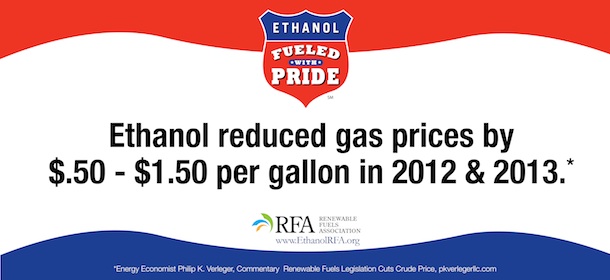Some interesting research coming out of MIT and UCAL Davis challenges claims by the biofuels industry that Renewable Fuel purchase mandates have resulted in enormous savings to fuel consumers. Claimed savings have been massive, indeed. Last month, energy economist Phil Verlager published an analysis concluding that
Crude oil today might easily sell at prices as high as or higher than in 2008. Preliminary econometric tests suggest the price at the end of August would have been $150 per barrel.
The implication for world consumers is clear. As noted in the August 2013 Petroleum Economics Monthly , the US renewable fuels program has cut annual consumer expenditures in 2013 between $700 billion and $2.6 trillion. This translates to consumers paying between $0.50 and $1.50 per gallon less for gasoline.
That's right: as much as $2.6 trillion in savings every year. In contrast, the few billion in subsidies sure look small. These figures are included in an updated ad campaign (below) by the Renewable Fuels Association, a biofuels trade promotion group.
And Verlager is not alone in claiming very large economic impacts. Using 2011 data, economists Dermot Hayes and Xiadong Hu of Iowa State University estimated average savings of $1.09 per gallon -- with savings in the mid-West region reaching as high as $1.69/gallon. Their estimated savings over a longer period (2000-2011) were significantly lower, though, at about $0.29/gallon.
Economists Christopher Knittel (MIT) and Aaron Smith (UCAL Davis) reworked the estimation approach used by Hayes and Wu and found it had a number of problems. They argued that a key metric (the crack ratio, or the price of gasoline divided by the price of oil) was over-generalized. They also argued that the earlier paper suggested a causal relationship with ethanol and crack ratio movements, rather than mere correlation. The Knittel and Smith analysis found a much smaller impact of ethanol blending mandates on prices to consumers. Knittel noted in an interview with the MIT news office that
In the very short run, if ethanol vanished tomorrow, we would be scrambling to find fuel to cover that for a week, or less than a month. But certainly within a month, increases in imports would relax or reduce that price impact.
The full paper can be accessed here. There's a fair bit of interchange as well between Knittel and Smith, and Hayes, and this provides an interesting window into the methods of both parties: Hayes 1. Knittel and Smith 1. Hayes 2.
RFA Ad campaign touting large savings from ethanol

I expect that Knittel and Smith are much closer to the true impacts than either Hayes and Wu or Verlager. The ethanol market share is simply too low to be causing shifts of such a large percentage of the market price. Further, continuing shifts in fuel market structure are likely to weaken the marginal impact of ethanol on fuel prices relative to other factors. These shifts include continued efficiency gains in the fleet, growing use of hybrids, ethanol fuel production above the blend wall, growing exports of refined fuels from the US, and increasing sources of oil.
An important related point to this general discussion of price impacts is that one shouldn't claim savings in gas prices from blending mandates while ignoring the negative impacts that these mandates have on consumers in other ways. For example, the ethanol subsidies (now dominated by the RFS) drive up the cost of animal feed and human food (the degree of which is another fiercely contested data point). This is properly seen as an offset to whatever gains may exist at the pump. There is also the direct cost of the subsidies themselves -- not only through biofuel support programs, but also from long-lived subsidy programs for irrigation and corn production are are increasingly being captured by the biofuels market segment as more and more crop ends up and fuel. And globally, there are negative impacts on land use as artificially high prices for biofuel production displace other claims on the land ranging from different food crops to ecological uses.